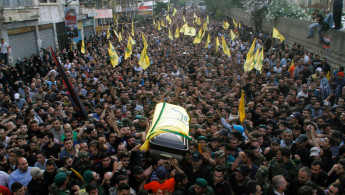Hizballah embroiled in Syria a decade after Israel war
The 2006 war erupted after Hizballah's capture of two Israeli soldiers on 12 July 2006 and still is viewed negatively in Israel, with analysts saying there was a lack of a clear strategy.
Chief of Staff Gadi Eisenkot, who was head of operations at the time, posted an open letter on Sunday paying tribute to the troops involved, and also saying lessons had been learned.
"The threat from Lebanon still exists and contains many challenges, and necessitates the (Israeli military) to be prepared for any scenario," Eisenkot wrote.
Earlier this year, he described the Iran-backed Hizballah as Israel's main enemy, and deputy chief of staff Yair Golan said in April that in any future crisis "it's going to be full-scale war".
Israel's military believes Hizballah has between 100,000 and 120,000 short- and medium-range missiles and rockets, as well as several hundred long-range missiles, with the medium-range missiles capable of reaching Tel Aviv.
Syria war
But now the group's focus is on the war in Syria where it is fighting in support of President Bashar al-Assad's regime.
 |
For now, Hizballah's attention is on Syria - Phillip Smyth, Washington Institute for Near East Police |
 |
It has sent thousands of fighters to help regime forces battle rebels and the Islamic State group.
"For now, Hizballah's attention is on Syria," Phillip Smyth, an adjunct fellow at the Washington Institute for Near East Policy told AFP.
"It's hard for them to open another front against a markedly superior foe like the Israelis, especially as they have to deal with fighting a multitude of foes across Syria."
Amid the chaos in Syria, Israel has also acknowledged attacking dozens of convoys there that were transporting weapons destined for Hizballah.
Israel occupied parts of Lebanon for 22 years until 2000, with Hizballah claiming credit for its withdrawal following persistent guerrilla attacks, and the two countries are still technically at war.
The 34-day conflict in 2006 led to the deaths of 1,200 people in Lebanon, mainly civilians, and 160 Israelis, mostly soldiers.
Hizballah fired thousands of rockets into northern Israel, while Israeli war planes heavily bombed Lebanon.
But Hizballah rocket fire did not stop and the two captured soldiers were never recovered.
Their bodies were later given back two years later in exchange for the release of five Lebanese prisoners, and former Prime Minister Ehud Olmert and military leaders faced heavy criticism for these failures.
An Israeli government report said there was a lack of planning and no clear exit strategy.
But the quiet on the Lebanese border shows that Hizballah is likely seriously stretched in Syria, and war between Israel and the Lebanese militia is unlikely to erupt soon.





![Israeli forces ordered bombed Gaza's Jabalia, ordering residents to leave [Getty]](/sites/default/files/styles/image_330x185/public/2176418030.jpeg?h=a5f2f23a&itok=_YGZaP1z)

